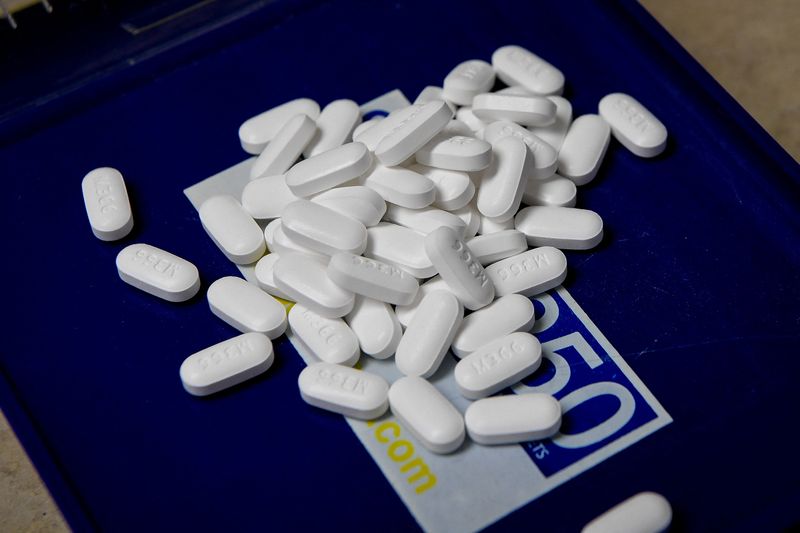By Brendan Pierson
(Reuters) -CVS Health Corp, Walgreens Boots Alliance Inc and Walmart Inc agreed to pay about $13.8 billion to resolve thousands of U.S. state and local lawsuits accusing the pharmacy chains of mishandling opioid pain drugs, potentially bringing years of litigation close to the finish line.
CVS said on Wednesday it had agreed to pay about $5 billion over 10 years, and Walgreens said that it had agreed to pay about $5.7 billion over 15 years. Neither company admitted wrongdoing. Walmart has agreed to pay $3.1 billion, mostly up front, according to two people familiar with the matter.
Paul Geller, one of the lawyers who negotiated for the governments, said that settlements with pharmacies “will bring billions of additional dollars to communities that are desperate for funds to combat the epidemic” of opioid addiction.
“We know that reckless, profit-driven dispensing practices fueled the crisis; but we know just as surely that with better systems in place and proper heeding of red flag warnings, pharmacies can play a direct role in reducing opioid abuse and in saving lives,” Geller said.
CVS general counsel Thomas Moriarty said in a statement the company was pleased to resolve the claims and the deal was “in the best interest of all parties, as well as our customers, colleagues and shareholders.”
Walgreens in a statement said: “As one of the largest pharmacy chains in the nation, we remain committed to being a part of the solution, and this settlement framework will allow us to keep our focus on the health and wellbeing of our customers and patients, while making positive contributions to address the opioid crisis.”
Both CVS and Walgreens said their agreements would not be final until certain non-monetary terms were worked out, and that the total amount could be reduced if not enough government plaintiffs sign on.
Walmart did not immediately respond to a request for comment.
The proposed settlement, which would be the first nationwide deal with retail pharmacy companies, follows nationwide opioid settlements with drugmakers and distributors totaling more than $33 billion.
HUMAN AND ECONOMIC TOLL
In more than 3,300 lawsuits, beginning in 2017, state, local and Native American tribal governments accused drugmakers of downplaying the risks of their opioid pain medicines, and distributors and pharmacies of ignoring red flags that prescriptions were being diverted into illegal trafficking.
They said the resulting human toll, as well as strain on public health services and law enforcement, was a public nuisance that the companies must pay to fix.
CVS, Walgreens and Walmart are the three largest retail pharmacies in the country by market share. If their settlement becomes final, it will put much of the sprawling, years-long litigation over opioids to rest, though cases are still pending against smaller, more regionally focused pharmacy operators including Rite Aid Corp and Kroger Co.
Plaintiffs had scored some significant trial victories against pharmacy chains, including a $650.6 million judgment in favor of two Ohio counties against CVS, Walgreens and Walmart, and a ruling that Walgreens contributed to San Francisco’s opioid epidemic.
San Francisco is not included in the national settlement, and is scheduled to begin a second trial against Walgreens next week to determine how much the company must pay.
State and local authorities have said they will use the money from the settlements to combat the opioid crisis, which according to federal government data has caused nearly 650,000 overdose deaths since 1999 and is continuing to worsen.
Prescriptions for opioids rose sharply in the 1990s as companies aggressively promoted the drugs, long used primarily in cancer patients, as a safe way to treat all kinds of chronic pain.
Overdoses involving opioids, including prescription pills and heroin, surged during the COVID-19 pandemic, increasing 38% in 2020 over the previous year and another 15% in 2021, according to the U.S. Centers for Disease Control and Prevention.
The agency has attributed much of the recent rise in overdose cases to illegally manufactured fentanyl, a powerful synthetic opioid.
A congressional report last month put the economic toll of the opioid crisis in 2020 alone at $1.5 trillion.
(Reporting by Baranjot Kaur in Bengaluru, Brendan Pierson in New York and Nate Raymond in Boston; Editing by Alexia Garamfalvi, Mark Potter and Bill Berkrot)

